Healthcare Ethics Case Study: Analyzing the Amos Cholera Outbreak
VerifiedAdded on 2021/06/14
|8
|2068
|22
Case Study
AI Summary
This case study analyzes the ethical issues arising from a scenario involving a high school student named Amos who was denied treatment for cholera due to resource limitations and discriminatory practices at a hospital in Malawi. The analysis explores the ethical concerns related to the triage nurse and doctor's biased approach, inequity, and discrimination in care provision. It examines violations of human rights, as well as the Australian Charter of Health Care, and the Code of Ethics for Nurses in Australia. The paper also discusses the Registered Nurse Standards for Practice and the Code of Professional Conduct, highlighting breaches of ethical principles such as beneficence, non-maleficence, and justice. The study recommends that healthcare professionals apply ethical principles, provide preliminary care, and consider referrals to ensure safe and effective patient outcomes. The analysis emphasizes the importance of ethical decision-making in healthcare to address dilemmas and promote effective care delivery.
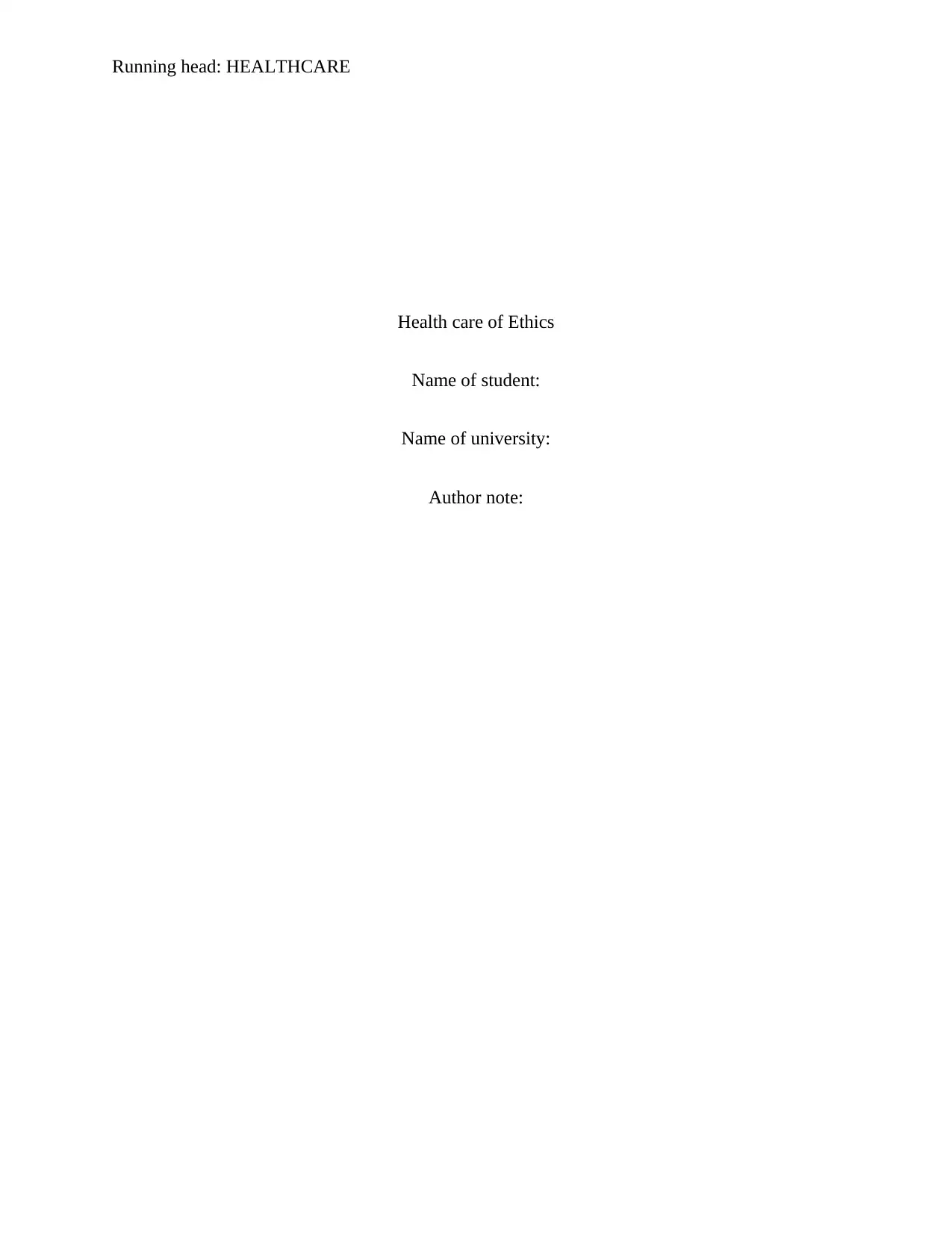
Running head: HEALTHCARE
Health care of Ethics
Name of student:
Name of university:
Author note:
Health care of Ethics
Name of student:
Name of university:
Author note:
Paraphrase This Document
Need a fresh take? Get an instant paraphrase of this document with our AI Paraphraser
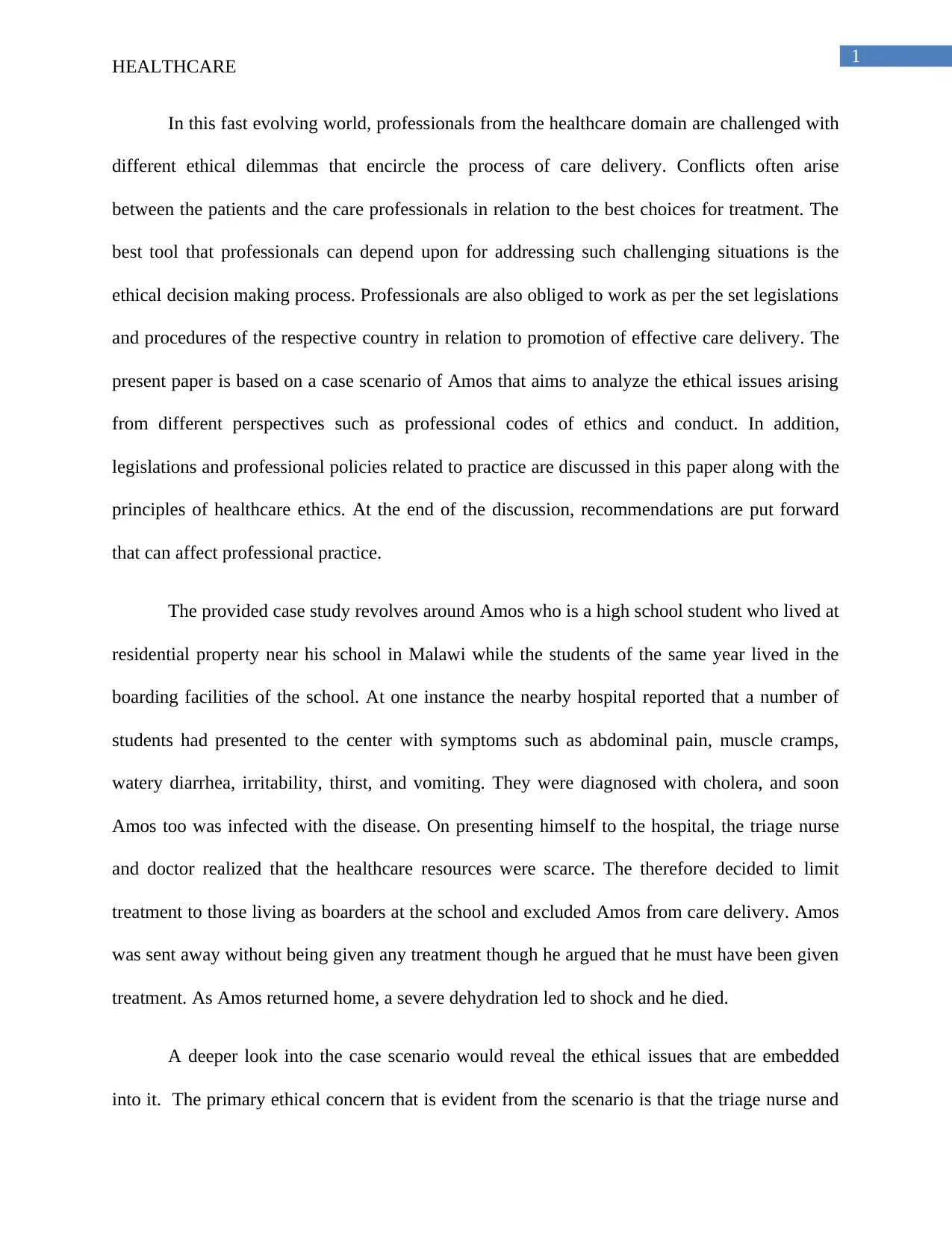
1
HEALTHCARE
In this fast evolving world, professionals from the healthcare domain are challenged with
different ethical dilemmas that encircle the process of care delivery. Conflicts often arise
between the patients and the care professionals in relation to the best choices for treatment. The
best tool that professionals can depend upon for addressing such challenging situations is the
ethical decision making process. Professionals are also obliged to work as per the set legislations
and procedures of the respective country in relation to promotion of effective care delivery. The
present paper is based on a case scenario of Amos that aims to analyze the ethical issues arising
from different perspectives such as professional codes of ethics and conduct. In addition,
legislations and professional policies related to practice are discussed in this paper along with the
principles of healthcare ethics. At the end of the discussion, recommendations are put forward
that can affect professional practice.
The provided case study revolves around Amos who is a high school student who lived at
residential property near his school in Malawi while the students of the same year lived in the
boarding facilities of the school. At one instance the nearby hospital reported that a number of
students had presented to the center with symptoms such as abdominal pain, muscle cramps,
watery diarrhea, irritability, thirst, and vomiting. They were diagnosed with cholera, and soon
Amos too was infected with the disease. On presenting himself to the hospital, the triage nurse
and doctor realized that the healthcare resources were scarce. The therefore decided to limit
treatment to those living as boarders at the school and excluded Amos from care delivery. Amos
was sent away without being given any treatment though he argued that he must have been given
treatment. As Amos returned home, a severe dehydration led to shock and he died.
A deeper look into the case scenario would reveal the ethical issues that are embedded
into it. The primary ethical concern that is evident from the scenario is that the triage nurse and
HEALTHCARE
In this fast evolving world, professionals from the healthcare domain are challenged with
different ethical dilemmas that encircle the process of care delivery. Conflicts often arise
between the patients and the care professionals in relation to the best choices for treatment. The
best tool that professionals can depend upon for addressing such challenging situations is the
ethical decision making process. Professionals are also obliged to work as per the set legislations
and procedures of the respective country in relation to promotion of effective care delivery. The
present paper is based on a case scenario of Amos that aims to analyze the ethical issues arising
from different perspectives such as professional codes of ethics and conduct. In addition,
legislations and professional policies related to practice are discussed in this paper along with the
principles of healthcare ethics. At the end of the discussion, recommendations are put forward
that can affect professional practice.
The provided case study revolves around Amos who is a high school student who lived at
residential property near his school in Malawi while the students of the same year lived in the
boarding facilities of the school. At one instance the nearby hospital reported that a number of
students had presented to the center with symptoms such as abdominal pain, muscle cramps,
watery diarrhea, irritability, thirst, and vomiting. They were diagnosed with cholera, and soon
Amos too was infected with the disease. On presenting himself to the hospital, the triage nurse
and doctor realized that the healthcare resources were scarce. The therefore decided to limit
treatment to those living as boarders at the school and excluded Amos from care delivery. Amos
was sent away without being given any treatment though he argued that he must have been given
treatment. As Amos returned home, a severe dehydration led to shock and he died.
A deeper look into the case scenario would reveal the ethical issues that are embedded
into it. The primary ethical concern that is evident from the scenario is that the triage nurse and
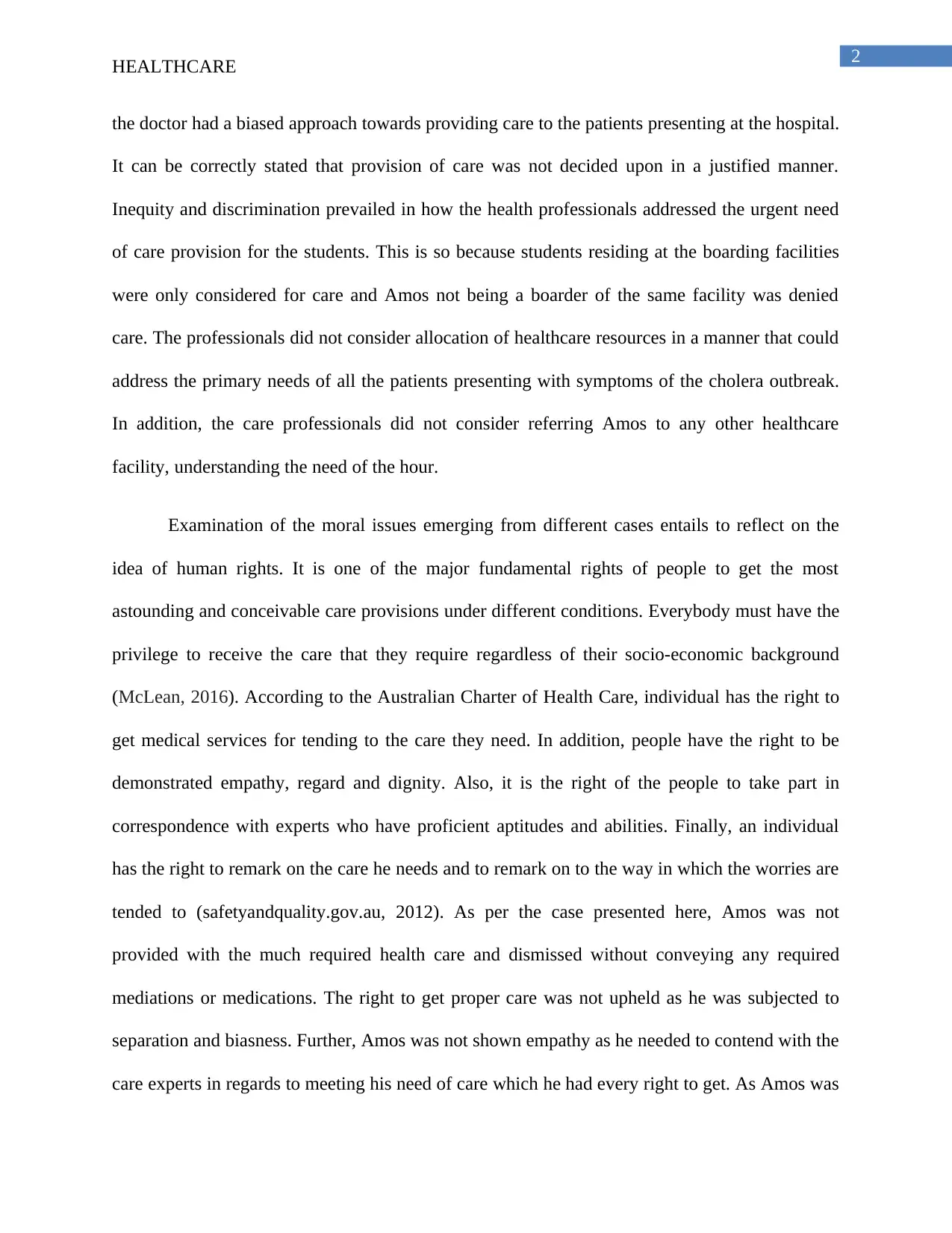
2
HEALTHCARE
the doctor had a biased approach towards providing care to the patients presenting at the hospital.
It can be correctly stated that provision of care was not decided upon in a justified manner.
Inequity and discrimination prevailed in how the health professionals addressed the urgent need
of care provision for the students. This is so because students residing at the boarding facilities
were only considered for care and Amos not being a boarder of the same facility was denied
care. The professionals did not consider allocation of healthcare resources in a manner that could
address the primary needs of all the patients presenting with symptoms of the cholera outbreak.
In addition, the care professionals did not consider referring Amos to any other healthcare
facility, understanding the need of the hour.
Examination of the moral issues emerging from different cases entails to reflect on the
idea of human rights. It is one of the major fundamental rights of people to get the most
astounding and conceivable care provisions under different conditions. Everybody must have the
privilege to receive the care that they require regardless of their socio-economic background
(McLean, 2016). According to the Australian Charter of Health Care, individual has the right to
get medical services for tending to the care they need. In addition, people have the right to be
demonstrated empathy, regard and dignity. Also, it is the right of the people to take part in
correspondence with experts who have proficient aptitudes and abilities. Finally, an individual
has the right to remark on the care he needs and to remark on to the way in which the worries are
tended to (safetyandquality.gov.au, 2012). As per the case presented here, Amos was not
provided with the much required health care and dismissed without conveying any required
mediations or medications. The right to get proper care was not upheld as he was subjected to
separation and biasness. Further, Amos was not shown empathy as he needed to contend with the
care experts in regards to meeting his need of care which he had every right to get. As Amos was
HEALTHCARE
the doctor had a biased approach towards providing care to the patients presenting at the hospital.
It can be correctly stated that provision of care was not decided upon in a justified manner.
Inequity and discrimination prevailed in how the health professionals addressed the urgent need
of care provision for the students. This is so because students residing at the boarding facilities
were only considered for care and Amos not being a boarder of the same facility was denied
care. The professionals did not consider allocation of healthcare resources in a manner that could
address the primary needs of all the patients presenting with symptoms of the cholera outbreak.
In addition, the care professionals did not consider referring Amos to any other healthcare
facility, understanding the need of the hour.
Examination of the moral issues emerging from different cases entails to reflect on the
idea of human rights. It is one of the major fundamental rights of people to get the most
astounding and conceivable care provisions under different conditions. Everybody must have the
privilege to receive the care that they require regardless of their socio-economic background
(McLean, 2016). According to the Australian Charter of Health Care, individual has the right to
get medical services for tending to the care they need. In addition, people have the right to be
demonstrated empathy, regard and dignity. Also, it is the right of the people to take part in
correspondence with experts who have proficient aptitudes and abilities. Finally, an individual
has the right to remark on the care he needs and to remark on to the way in which the worries are
tended to (safetyandquality.gov.au, 2012). As per the case presented here, Amos was not
provided with the much required health care and dismissed without conveying any required
mediations or medications. The right to get proper care was not upheld as he was subjected to
separation and biasness. Further, Amos was not shown empathy as he needed to contend with the
care experts in regards to meeting his need of care which he had every right to get. As Amos was
⊘ This is a preview!⊘
Do you want full access?
Subscribe today to unlock all pages.

Trusted by 1+ million students worldwide
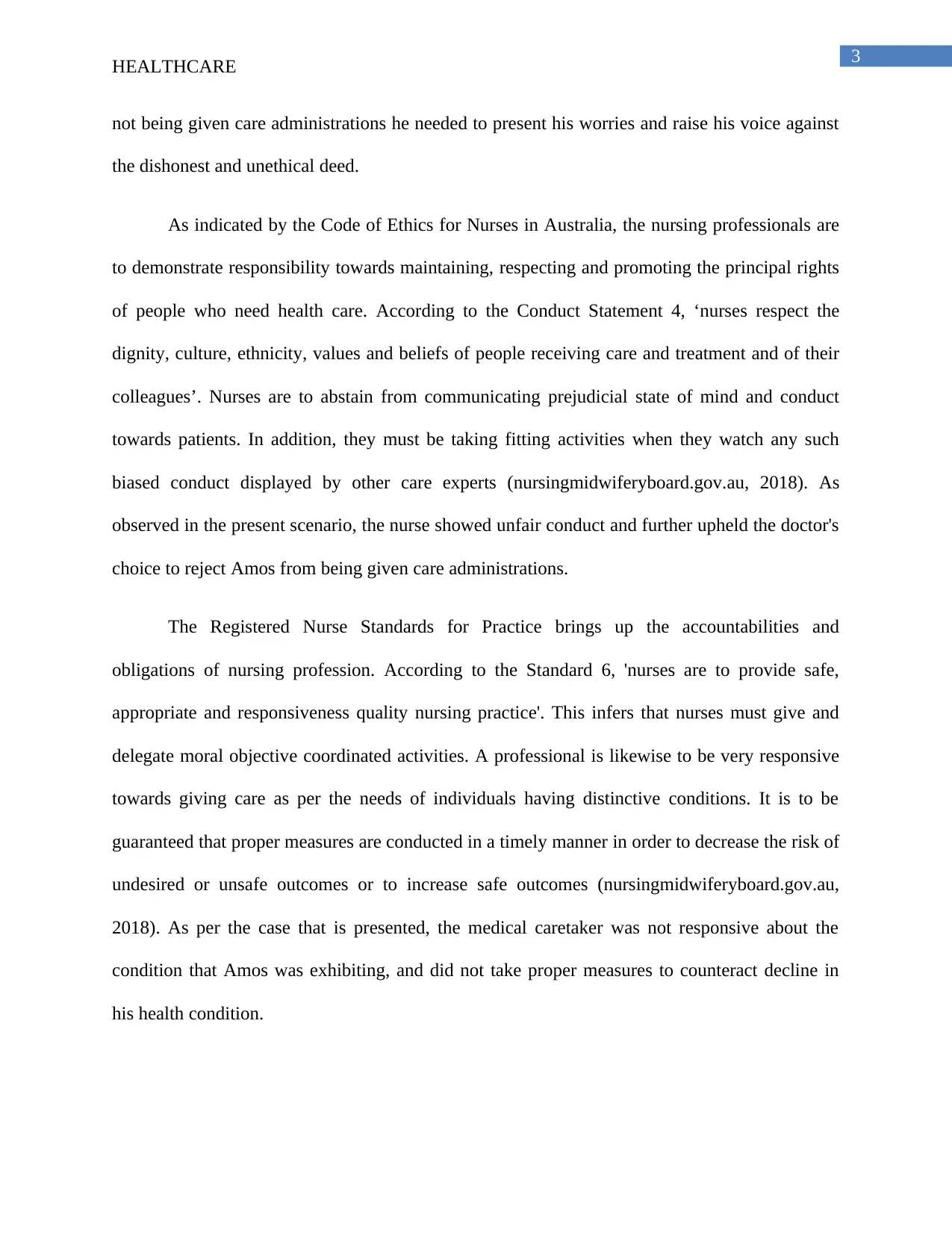
3
HEALTHCARE
not being given care administrations he needed to present his worries and raise his voice against
the dishonest and unethical deed.
As indicated by the Code of Ethics for Nurses in Australia, the nursing professionals are
to demonstrate responsibility towards maintaining, respecting and promoting the principal rights
of people who need health care. According to the Conduct Statement 4, ‘nurses respect the
dignity, culture, ethnicity, values and beliefs of people receiving care and treatment and of their
colleagues’. Nurses are to abstain from communicating prejudicial state of mind and conduct
towards patients. In addition, they must be taking fitting activities when they watch any such
biased conduct displayed by other care experts (nursingmidwiferyboard.gov.au, 2018). As
observed in the present scenario, the nurse showed unfair conduct and further upheld the doctor's
choice to reject Amos from being given care administrations.
The Registered Nurse Standards for Practice brings up the accountabilities and
obligations of nursing profession. According to the Standard 6, 'nurses are to provide safe,
appropriate and responsiveness quality nursing practice'. This infers that nurses must give and
delegate moral objective coordinated activities. A professional is likewise to be very responsive
towards giving care as per the needs of individuals having distinctive conditions. It is to be
guaranteed that proper measures are conducted in a timely manner in order to decrease the risk of
undesired or unsafe outcomes or to increase safe outcomes (nursingmidwiferyboard.gov.au,
2018). As per the case that is presented, the medical caretaker was not responsive about the
condition that Amos was exhibiting, and did not take proper measures to counteract decline in
his health condition.
HEALTHCARE
not being given care administrations he needed to present his worries and raise his voice against
the dishonest and unethical deed.
As indicated by the Code of Ethics for Nurses in Australia, the nursing professionals are
to demonstrate responsibility towards maintaining, respecting and promoting the principal rights
of people who need health care. According to the Conduct Statement 4, ‘nurses respect the
dignity, culture, ethnicity, values and beliefs of people receiving care and treatment and of their
colleagues’. Nurses are to abstain from communicating prejudicial state of mind and conduct
towards patients. In addition, they must be taking fitting activities when they watch any such
biased conduct displayed by other care experts (nursingmidwiferyboard.gov.au, 2018). As
observed in the present scenario, the nurse showed unfair conduct and further upheld the doctor's
choice to reject Amos from being given care administrations.
The Registered Nurse Standards for Practice brings up the accountabilities and
obligations of nursing profession. According to the Standard 6, 'nurses are to provide safe,
appropriate and responsiveness quality nursing practice'. This infers that nurses must give and
delegate moral objective coordinated activities. A professional is likewise to be very responsive
towards giving care as per the needs of individuals having distinctive conditions. It is to be
guaranteed that proper measures are conducted in a timely manner in order to decrease the risk of
undesired or unsafe outcomes or to increase safe outcomes (nursingmidwiferyboard.gov.au,
2018). As per the case that is presented, the medical caretaker was not responsive about the
condition that Amos was exhibiting, and did not take proper measures to counteract decline in
his health condition.
Paraphrase This Document
Need a fresh take? Get an instant paraphrase of this document with our AI Paraphraser
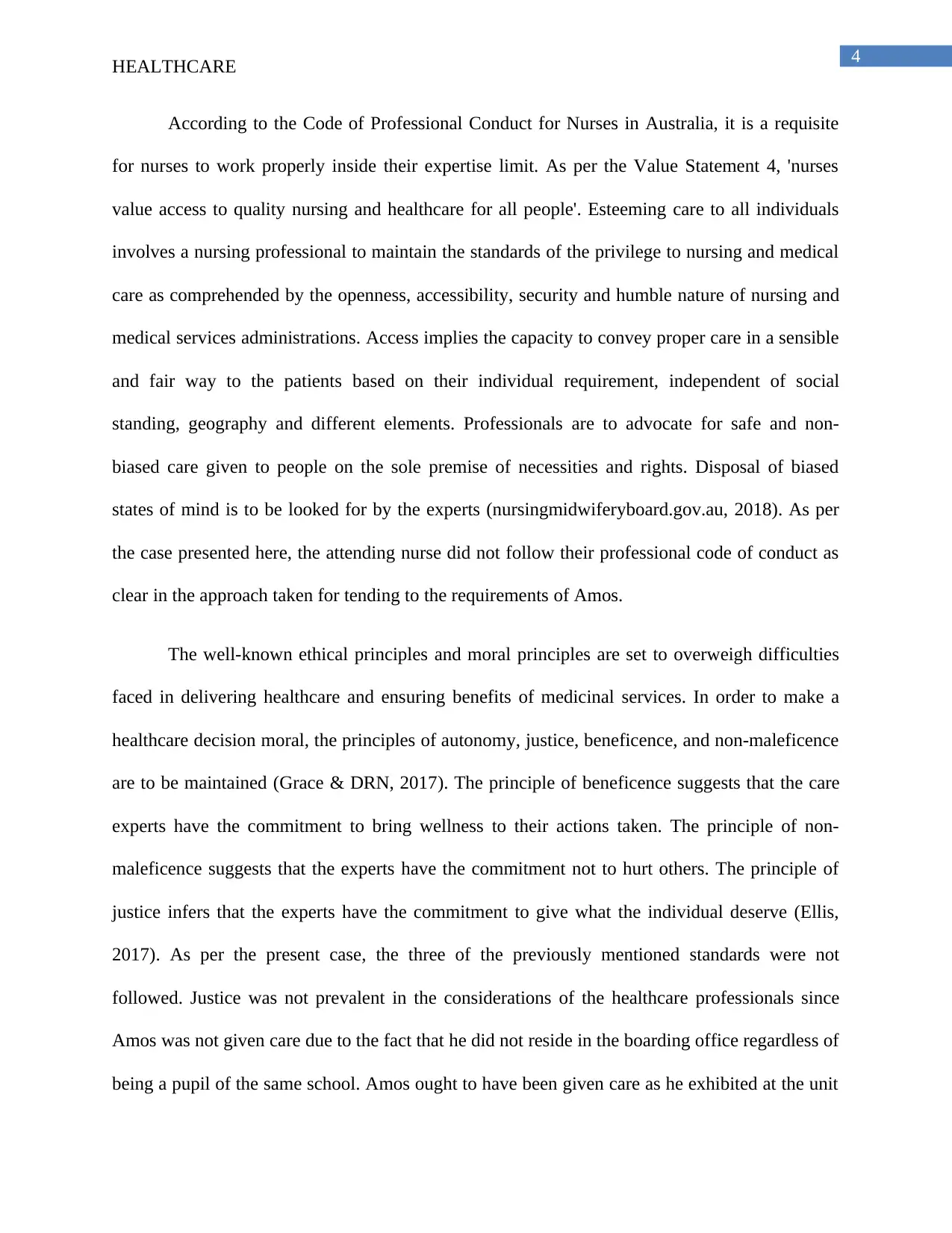
4
HEALTHCARE
According to the Code of Professional Conduct for Nurses in Australia, it is a requisite
for nurses to work properly inside their expertise limit. As per the Value Statement 4, 'nurses
value access to quality nursing and healthcare for all people'. Esteeming care to all individuals
involves a nursing professional to maintain the standards of the privilege to nursing and medical
care as comprehended by the openness, accessibility, security and humble nature of nursing and
medical services administrations. Access implies the capacity to convey proper care in a sensible
and fair way to the patients based on their individual requirement, independent of social
standing, geography and different elements. Professionals are to advocate for safe and non-
biased care given to people on the sole premise of necessities and rights. Disposal of biased
states of mind is to be looked for by the experts (nursingmidwiferyboard.gov.au, 2018). As per
the case presented here, the attending nurse did not follow their professional code of conduct as
clear in the approach taken for tending to the requirements of Amos.
The well-known ethical principles and moral principles are set to overweigh difficulties
faced in delivering healthcare and ensuring benefits of medicinal services. In order to make a
healthcare decision moral, the principles of autonomy, justice, beneficence, and non-maleficence
are to be maintained (Grace & DRN, 2017). The principle of beneficence suggests that the care
experts have the commitment to bring wellness to their actions taken. The principle of non-
maleficence suggests that the experts have the commitment not to hurt others. The principle of
justice infers that the experts have the commitment to give what the individual deserve (Ellis,
2017). As per the present case, the three of the previously mentioned standards were not
followed. Justice was not prevalent in the considerations of the healthcare professionals since
Amos was not given care due to the fact that he did not reside in the boarding office regardless of
being a pupil of the same school. Amos ought to have been given care as he exhibited at the unit
HEALTHCARE
According to the Code of Professional Conduct for Nurses in Australia, it is a requisite
for nurses to work properly inside their expertise limit. As per the Value Statement 4, 'nurses
value access to quality nursing and healthcare for all people'. Esteeming care to all individuals
involves a nursing professional to maintain the standards of the privilege to nursing and medical
care as comprehended by the openness, accessibility, security and humble nature of nursing and
medical services administrations. Access implies the capacity to convey proper care in a sensible
and fair way to the patients based on their individual requirement, independent of social
standing, geography and different elements. Professionals are to advocate for safe and non-
biased care given to people on the sole premise of necessities and rights. Disposal of biased
states of mind is to be looked for by the experts (nursingmidwiferyboard.gov.au, 2018). As per
the case presented here, the attending nurse did not follow their professional code of conduct as
clear in the approach taken for tending to the requirements of Amos.
The well-known ethical principles and moral principles are set to overweigh difficulties
faced in delivering healthcare and ensuring benefits of medicinal services. In order to make a
healthcare decision moral, the principles of autonomy, justice, beneficence, and non-maleficence
are to be maintained (Grace & DRN, 2017). The principle of beneficence suggests that the care
experts have the commitment to bring wellness to their actions taken. The principle of non-
maleficence suggests that the experts have the commitment not to hurt others. The principle of
justice infers that the experts have the commitment to give what the individual deserve (Ellis,
2017). As per the present case, the three of the previously mentioned standards were not
followed. Justice was not prevalent in the considerations of the healthcare professionals since
Amos was not given care due to the fact that he did not reside in the boarding office regardless of
being a pupil of the same school. Amos ought to have been given care as he exhibited at the unit
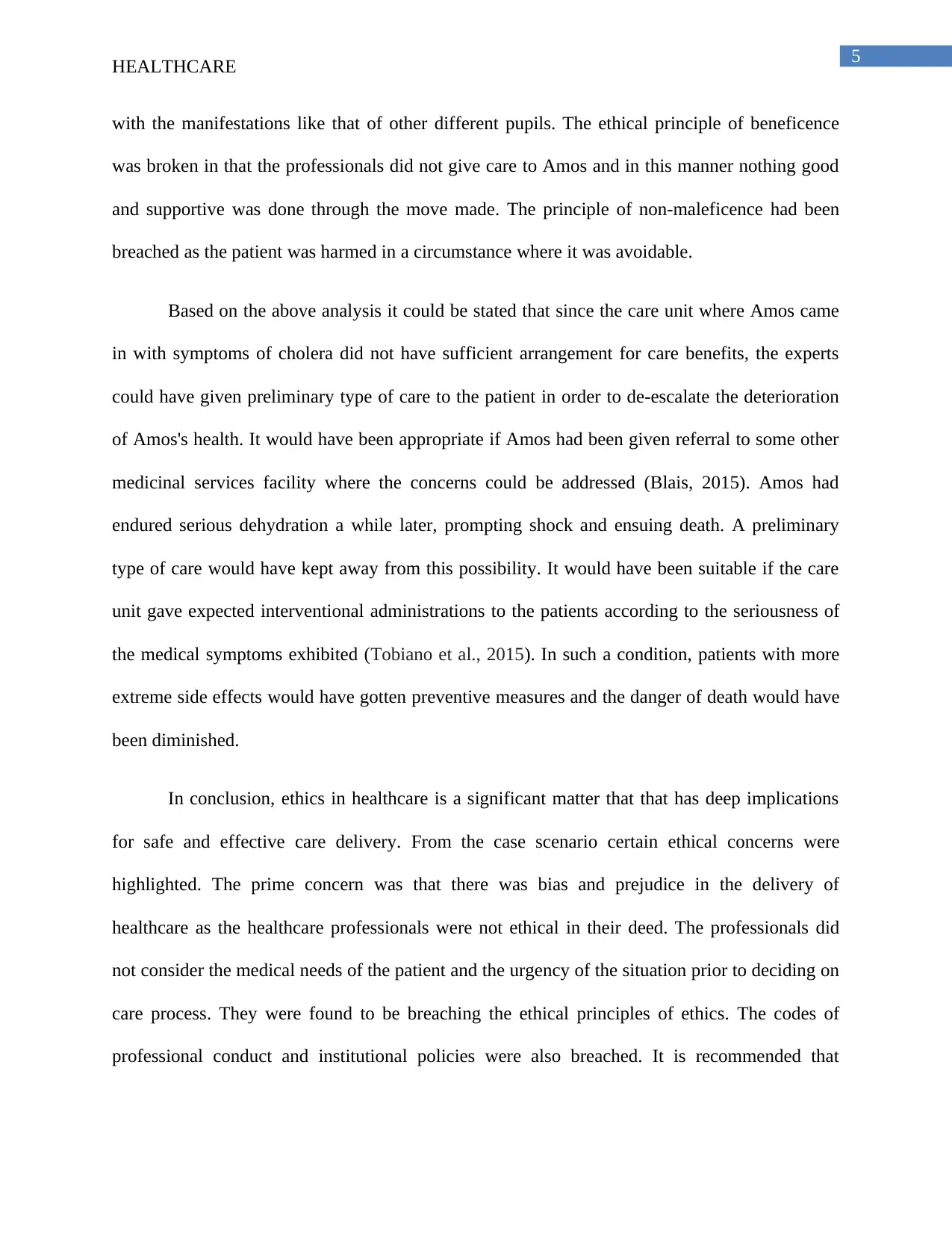
5
HEALTHCARE
with the manifestations like that of other different pupils. The ethical principle of beneficence
was broken in that the professionals did not give care to Amos and in this manner nothing good
and supportive was done through the move made. The principle of non-maleficence had been
breached as the patient was harmed in a circumstance where it was avoidable.
Based on the above analysis it could be stated that since the care unit where Amos came
in with symptoms of cholera did not have sufficient arrangement for care benefits, the experts
could have given preliminary type of care to the patient in order to de-escalate the deterioration
of Amos's health. It would have been appropriate if Amos had been given referral to some other
medicinal services facility where the concerns could be addressed (Blais, 2015). Amos had
endured serious dehydration a while later, prompting shock and ensuing death. A preliminary
type of care would have kept away from this possibility. It would have been suitable if the care
unit gave expected interventional administrations to the patients according to the seriousness of
the medical symptoms exhibited (Tobiano et al., 2015). In such a condition, patients with more
extreme side effects would have gotten preventive measures and the danger of death would have
been diminished.
In conclusion, ethics in healthcare is a significant matter that that has deep implications
for safe and effective care delivery. From the case scenario certain ethical concerns were
highlighted. The prime concern was that there was bias and prejudice in the delivery of
healthcare as the healthcare professionals were not ethical in their deed. The professionals did
not consider the medical needs of the patient and the urgency of the situation prior to deciding on
care process. They were found to be breaching the ethical principles of ethics. The codes of
professional conduct and institutional policies were also breached. It is recommended that
HEALTHCARE
with the manifestations like that of other different pupils. The ethical principle of beneficence
was broken in that the professionals did not give care to Amos and in this manner nothing good
and supportive was done through the move made. The principle of non-maleficence had been
breached as the patient was harmed in a circumstance where it was avoidable.
Based on the above analysis it could be stated that since the care unit where Amos came
in with symptoms of cholera did not have sufficient arrangement for care benefits, the experts
could have given preliminary type of care to the patient in order to de-escalate the deterioration
of Amos's health. It would have been appropriate if Amos had been given referral to some other
medicinal services facility where the concerns could be addressed (Blais, 2015). Amos had
endured serious dehydration a while later, prompting shock and ensuing death. A preliminary
type of care would have kept away from this possibility. It would have been suitable if the care
unit gave expected interventional administrations to the patients according to the seriousness of
the medical symptoms exhibited (Tobiano et al., 2015). In such a condition, patients with more
extreme side effects would have gotten preventive measures and the danger of death would have
been diminished.
In conclusion, ethics in healthcare is a significant matter that that has deep implications
for safe and effective care delivery. From the case scenario certain ethical concerns were
highlighted. The prime concern was that there was bias and prejudice in the delivery of
healthcare as the healthcare professionals were not ethical in their deed. The professionals did
not consider the medical needs of the patient and the urgency of the situation prior to deciding on
care process. They were found to be breaching the ethical principles of ethics. The codes of
professional conduct and institutional policies were also breached. It is recommended that
⊘ This is a preview!⊘
Do you want full access?
Subscribe today to unlock all pages.

Trusted by 1+ million students worldwide
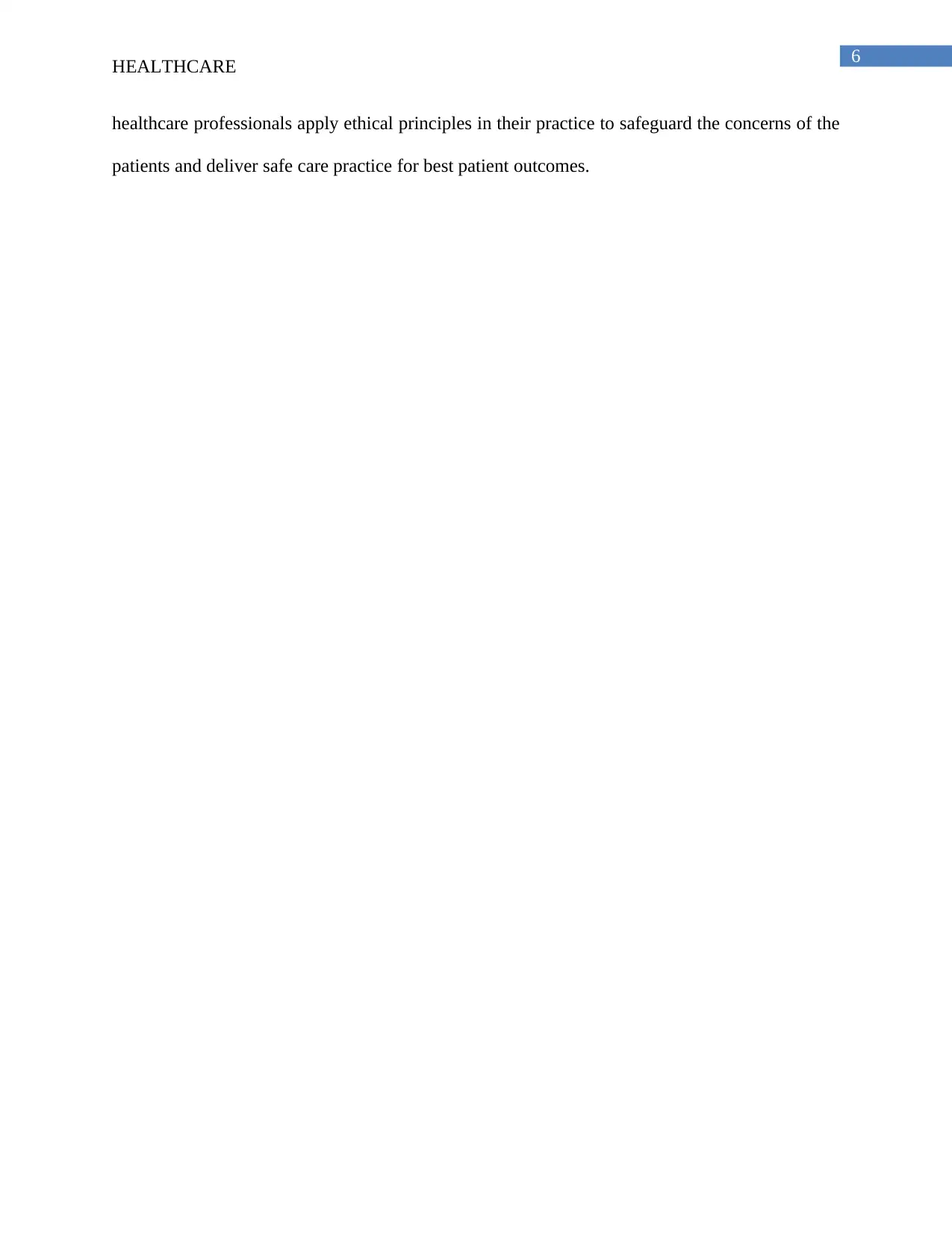
6
HEALTHCARE
healthcare professionals apply ethical principles in their practice to safeguard the concerns of the
patients and deliver safe care practice for best patient outcomes.
HEALTHCARE
healthcare professionals apply ethical principles in their practice to safeguard the concerns of the
patients and deliver safe care practice for best patient outcomes.
Paraphrase This Document
Need a fresh take? Get an instant paraphrase of this document with our AI Paraphraser
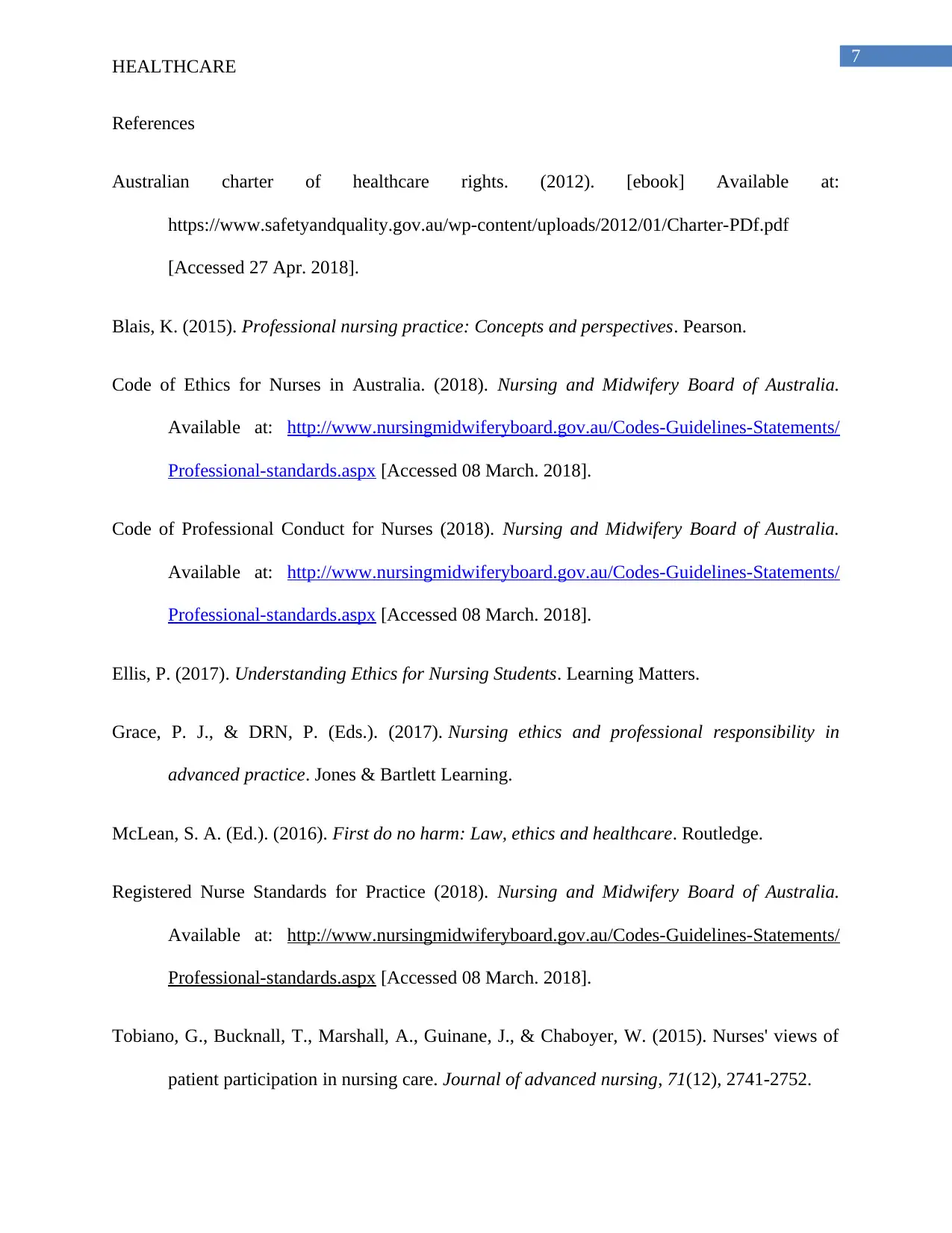
7
HEALTHCARE
References
Australian charter of healthcare rights. (2012). [ebook] Available at:
https://www.safetyandquality.gov.au/wp-content/uploads/2012/01/Charter-PDf.pdf
[Accessed 27 Apr. 2018].
Blais, K. (2015). Professional nursing practice: Concepts and perspectives. Pearson.
Code of Ethics for Nurses in Australia. (2018). Nursing and Midwifery Board of Australia.
Available at: http://www.nursingmidwiferyboard.gov.au/Codes-Guidelines-Statements/
Professional-standards.aspx [Accessed 08 March. 2018].
Code of Professional Conduct for Nurses (2018). Nursing and Midwifery Board of Australia.
Available at: http://www.nursingmidwiferyboard.gov.au/Codes-Guidelines-Statements/
Professional-standards.aspx [Accessed 08 March. 2018].
Ellis, P. (2017). Understanding Ethics for Nursing Students. Learning Matters.
Grace, P. J., & DRN, P. (Eds.). (2017). Nursing ethics and professional responsibility in
advanced practice. Jones & Bartlett Learning.
McLean, S. A. (Ed.). (2016). First do no harm: Law, ethics and healthcare. Routledge.
Registered Nurse Standards for Practice (2018). Nursing and Midwifery Board of Australia.
Available at: http://www.nursingmidwiferyboard.gov.au/Codes-Guidelines-Statements/
Professional-standards.aspx [Accessed 08 March. 2018].
Tobiano, G., Bucknall, T., Marshall, A., Guinane, J., & Chaboyer, W. (2015). Nurses' views of
patient participation in nursing care. Journal of advanced nursing, 71(12), 2741-2752.
HEALTHCARE
References
Australian charter of healthcare rights. (2012). [ebook] Available at:
https://www.safetyandquality.gov.au/wp-content/uploads/2012/01/Charter-PDf.pdf
[Accessed 27 Apr. 2018].
Blais, K. (2015). Professional nursing practice: Concepts and perspectives. Pearson.
Code of Ethics for Nurses in Australia. (2018). Nursing and Midwifery Board of Australia.
Available at: http://www.nursingmidwiferyboard.gov.au/Codes-Guidelines-Statements/
Professional-standards.aspx [Accessed 08 March. 2018].
Code of Professional Conduct for Nurses (2018). Nursing and Midwifery Board of Australia.
Available at: http://www.nursingmidwiferyboard.gov.au/Codes-Guidelines-Statements/
Professional-standards.aspx [Accessed 08 March. 2018].
Ellis, P. (2017). Understanding Ethics for Nursing Students. Learning Matters.
Grace, P. J., & DRN, P. (Eds.). (2017). Nursing ethics and professional responsibility in
advanced practice. Jones & Bartlett Learning.
McLean, S. A. (Ed.). (2016). First do no harm: Law, ethics and healthcare. Routledge.
Registered Nurse Standards for Practice (2018). Nursing and Midwifery Board of Australia.
Available at: http://www.nursingmidwiferyboard.gov.au/Codes-Guidelines-Statements/
Professional-standards.aspx [Accessed 08 March. 2018].
Tobiano, G., Bucknall, T., Marshall, A., Guinane, J., & Chaboyer, W. (2015). Nurses' views of
patient participation in nursing care. Journal of advanced nursing, 71(12), 2741-2752.
1 out of 8
Related Documents
Your All-in-One AI-Powered Toolkit for Academic Success.
+13062052269
info@desklib.com
Available 24*7 on WhatsApp / Email
![[object Object]](/_next/static/media/star-bottom.7253800d.svg)
Unlock your academic potential
Copyright © 2020–2026 A2Z Services. All Rights Reserved. Developed and managed by ZUCOL.





